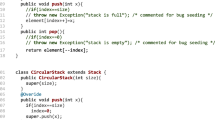Abstract
Confinement is used to prohibit safety-critical objects from unintended access. Approaches for specifying and verifying confinement have been proposed in the last twenty years but their application has been help back. We develop a novel framework for specifying and verifying object confinement in object-oriented (OO) programs. Instead of expressing the confinement requirements within a class for possible future usage, as with ownership types, we specify confinement requirements of the class in its usage class which actually intends to confine the parts, i.e., internal representations. Syntactically, an optional conf clause is introduced in class declarations for annotating the confined attribute-paths. A “same type and confinement” notation is introduced for expressing type and confinement dependence among variables, parameters, and return values of methods. Based on the extension to a Java-like language and existing techniques of alias analysis, we define a sound type-system for checking the well-confinedness of OO programs with respect to the confinement specifications.
Similar content being viewed by others
Explore related subjects
Discover the latest articles and news from researchers in related subjects, suggested using machine learning.References
Hogg J, Lea D, Wills A, Dechampeaux D, Holt R. The geneva convention on the treatment of object aliasing. ACM SIGPLAN OOPS Messenger, 1992, 3(2): 11–16
Clarke D, Drossopoulou S, Noble J, Wrigstad T. Aliasing, confinement, and ownership in object-oriented programming. Lecture Notes in Computer Science, 2008, 4906: 40
Grothoff C, Palsberg J, Vitek J. Encapsulating objects with confined types. In: Proceedings of ACMSIGPLAN Notices, 2001, 36(11): 241–255
Hogg J. Islands: aliasing protection in object-oriented languages. In: Proceedings of ACM SIGPLAN Notices. 1991, 271–285
Almeida P. Balloon types: controlling sharing of state in data types. In: Proceedings of ECOOP’97-Object-Oriented Programming. 1997, 32–59
Vitek J, Bokowski B. Confined types. In: Proceedings of ACM SIGPLAN Notices. 1999, 82–96
Vitek J, Bokowski B. Confined types in Java. Software: Practice and Experience, 2001, 31(6): 507–532
Zhao T, Palsberg J, Vitek J. Lightweight confinement for featherweight Java. In: Proceedings of ACM SIGPLAN Notices. 2003, 135–148
Clarke D, Potter J, Noble J. Ownership types for flexible alias protection. In: Proceedings of ACMSIGPLAN Notices, 1998, 33(10): 48–64
Clarke D. Ownership types and containment. Dissertation for Doctoral Degree. Australia: University of New South Wales, 2001
Müller P, Poetzsch-Heffter A. Universes: a type system for controlling representation exposure. Technical Report 263, FernUniversitat Hagen. 1999
Müller P.Modular specification and verification of object-oriented programs. Lecture Notes in Computer Science 2262, Springer, 2002
Aldrich J, Chambers C. Ownership domains: separating aliasing policy from mechanism. In: Proceedings of ECOOP 2004 Object-Oriented Programming. 2004, 1–25
Meyer B. Eiffel: the language. Object-Oriented Series. New York: Prentice Hall, 1992
Wang S, Shu Q, Liu Y, Qiu Z. A semantic model of confinement and locality theorem. Frontiers of Computer Science in China, 2010, 4(1): 28–46
Boyapati C, Liskov B, Shrira L. Ownership types for object encapsulation. In: Proceedings of ACM SIGPLAN Notices, 2003, 38(1): 213–223
Qiu Z, Wang S, Long Q. Sequential Java: formal foundations. Technical Report, School of Mathematics, Peking University, 2007
Meyer B. Towards a theory and calculus of aliasing. Journal of Object Technology, 2010, 9(2): 37–74
Naeem N, Lhotàk O. Faster alias set analysis using summaries. Compiler Construction, 2011, 82–103
Clarke D, Noble J, Potter J. Simple ownership types for object containment. In: Proceedings of ECOOP 2001 Object-Oriented Programming. 2001, 53–76
Smith M, Drossopoulou S. Cheaper reasoning with ownership types. In: Proceedings of the 1st International Workshop on Aliasing, Confinement and Ownership in Object-oriented Programming (IWACO). 2003
Clarke D, Drossopoulou S. Ownership, encapsulation and the disjointness of type and effect. In: Proceedings of ACM SIGPLAN Notices, 2002, 37(11): 292–310
Aldrich J, Kostadinov V, Chambers C. Alias annotations for program understanding. In: Proceedings of ACM SIGPLAN Notices, 2002, 311–330
Chin W, Khoo S, Qin S, Popeea C, Nguyen H. Verifying safety policies with size properties and alias controls. In: Proceedings of the 27th International Conference on Software Engineering. 2005, 186–195
Dietl W, Drossopoulou S, Müller P. Generic universe types. In: Proceedings of ECOOP 2007 Object-Oriented Programming. 2007, 28–53
Dietl W, Müller P. Universes: lightweight ownership for JML. Journal of Object Technology, 2005, 4: 5–32
Dietl W, Ernst M, Müller P. Tunable static inference for generic universe types. In: Proceedings of ECOOP 2011 Object-Oriented Programming. 2011, 333–357
Cameron N, Drossopoulou S, Noble J, Smith M. Multiple ownership. In: Proceedings of ACM SIGPLAN Notices. 2007, 441–460
Potanin A, Noble J, Clarke D, Biddle R. Generic ownership for generic Java. In: Proceedings of SIGPLAN Notices, 2006, 41(10): 311–324
Author information
Authors and Affiliations
Corresponding author
Additional information
Qin Shu is a researcher in the Department of Informatics, School of Mathematical Sciences, Peking University. Her research interests include semantics, specification, and object confinement of object-oriented programs. She received her BS from Harbin Institute Technology of Institute in 2006, and received her PhD from Peking University in 2012.
Zongyan Qiu is a professor in the Department of Informatics, School of Mathematical Sciences, Peking University. His research interests include formal methods, semantics of programming languages, and specification and verification of programs, especially for OO languages and programs. He received his MSc from Peking university. He is a member of IEEE and ACM.
Shuling Wang is an assistant research professor at the Institute of Software, Chinese Academy of Sciences (ISCAS). She received her PhD in 2008 from the School of Mathematical Sciences, Peking University, and since then, she has been a postdoc research fellow at UNU-IIST and ISCAS. Her current research is in hybrid systems and object-oriented programs, both related to formal modelling, semantics, and verification.
Rights and permissions
About this article
Cite this article
Shu, Q., Qiu, Z. & Wang, S. Confinement framework for encapsulating objects. Front. Comput. Sci. 7, 236–256 (2013). https://doi.org/10.1007/s11704-013-1259-7
Received:
Accepted:
Published:
Issue Date:
DOI: https://doi.org/10.1007/s11704-013-1259-7




